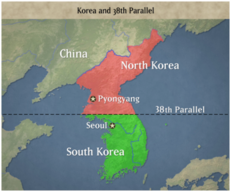
Due to the lack of published academic work attributing the United Nations (UN) to the divide in Korea, this intriguing and controversial topic is most unique and refreshing. The struggle of the divided Korean people was regrettably largely overshadowed by the greater global context of the Cold War up until 1991 and so western historians, in particular, have only recently begun to consider the nature of the 1945 split down the 38th parallel. Furthermore, the irony of the statement is not lost in this paper and indeed it threatens to undermine the United Nations’ reputation as keepers of world peace if one were to conclude that the organisation was in fact in any way responsible for dividing a country and even partially instigating the development of the current military dictatorship in North Korea. It is worth noting here briefly that however limited the historiography of the topic, schools of thought have still emerged somewhat as a tangent of Cold War academia with Orthodox, Revisionist and Post Revisionist perspectives. This series of articles will therefore, taking the limited historiography into account, attempt to overcome the limits of the academic void for this topic and critically assess this fascinating episode in history in order to determine to what extent the United Nations could and should be held responsible for the present extreme divide between North and South Korea.
In order to do this, there are a number of factors that must be considered and compared. Primarily, the paper will note the impact of the United Nation’s decision to allow the division of Korea between the Soviet Union in North Korea and the USA in South Korea. In doing so the UN effectively allowed Korea, a country with a sound government system stemming back a thousand years, to become simply a proxy for the rival superpowers to fight over; to borrow a well-known Cold War analogy, it was like two dogs fighting over a bone. In addition to this point, we must consider the manner in which the ‘democratic’ elections in Korea deepened the Communist and Capitalist divide between North and South. Secondly, though the stance of the UN in the Korean War (1950-53) is well known, little consideration has been given to the extent of the United States’ influence and control over the United Nations, particularly their military forces. US General Douglas MacArthur led the combined forces of the US Army and United Nations’ troops under the title of ‘Unified Command’ yet in a report in 1950 New York Times noted that President Truman had applied great pressure on the UN and that even still they had agreed only to the use of the UN flag and name in the war if applied with ‘discretion’. If, upon further investigation, the paper finds the US guilty of abusing the United Nations’ prestige as a symbol of morality to help justify their own ends in combatting the USSR in North Korea, then it not only diverts a large amount of blame on to the US, but also leads us to question why the UN did not speak out or protest more against the corrupt US; thus still not at all removing them entirely from blame. Thirdly, the paper will consider to what extent a select few key individuals ensured the escalation of the war and deterred all hopes of a united Korea. Furthermore, as much to blame as the USA may be, let us not forget the role of China and the USSR as agressors in North Korea; as ultimately North Korea is the corrupt police state in modern day, not the South. Finally, it is imperative that one considers the roles of North and South Korea themselves before concluding. No matter what blame we may find upon the head of the UN or any other factors in instigating the division, it would be naïve to consider this topic without at least briefly mentioning internal developments within Korea.
.

0 Comment:
Be the first one to comment on this article.